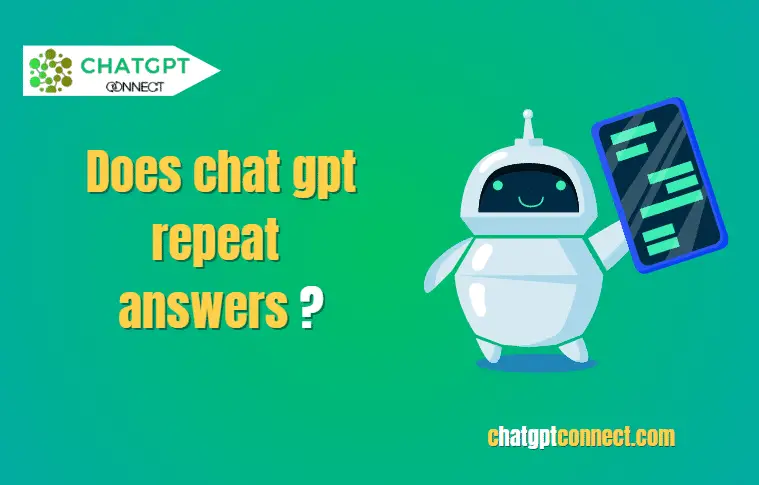Introduction :
ChatGPT, powered by OpenAI, is an advanced language model designed to generate human-like responses based on the input it receives. As an AI-driven conversational agent, one question that arises is whether ChatGPT tends to repeat answers. In this article, we will explore the nature of language models, understand factors that contribute to repetition, evaluate ChatGPT’s response patterns, and discuss strategies to overcome repetition while maintaining specificity and context.
Understanding ChatGPT
Before diving into the topic of repetition, it is important to understand the fundamentals of ChatGPT. ChatGPT is an instance of a language model, which is a type of AI model trained on vast amounts of text data. It learns patterns, grammar, and vocabulary from the data it’s exposed to, enabling it to generate coherent and contextually relevant responses.
The Nature of Language Models
Language models, like ChatGPT, are statistical models that assign probabilities to sequences of words. They make predictions based on the patterns and context they have learned during training. However, despite their advanced capabilities, language models are not perfect and can sometimes produce repetitive responses.
Perplexity and Burstiness
Perplexity refers to the level of uncertainty or surprise a language model experiences when predicting the next word in a sequence. Burstiness, on the other hand, refers to the tendency of language models to generate multiple responses with similar content. Both perplexity and burstiness can contribute to repeated answers from ChatGPT.
Evaluating ChatGPT’s Responses
To assess the repetition in ChatGPT’s responses, we need to consider various factors that influence its behavior.
Factors Influencing Repetition
- Training Data Bias: Language models learn from the data they are trained on, and if the training data contains repetitive patterns or biases, the model may inadvertently produce similar responses.
- User Input Ambiguity: Ambiguous or incomplete user input can lead to ChatGPT providing similar answers to different variations of the same question.
Promoting Diversity in Responses
To combat repetition and enhance the diversity of ChatGPT’s responses, several strategies can be employed.
Overcoming Repetition
- Fine-tuning and Specificity: Fine-tuning the language model on specific domains or topics can reduce repetition by enabling it to generate more contextually appropriate responses.
- Customizing ChatGPT’s Behavior: Users can provide explicit instructions or preferences to ChatGPT, guiding it to generate responses that align with their needs.
Training Data and Moderation
OpenAI actively works on reducing biases in training data and improving moderation techniques to ensure that ChatGPT produces more accurate, unbiased, and varied responses.
Conclusion :
In conclusion, while ChatGPT may exhibit repetition in its responses, it is important to consider the underlying factors such as training data bias and user input ambiguity. OpenAI
continues to work on improving the diversity and specificity of ChatGPT’s responses through fine-tuning, customization, and moderation techniques. By fine-tuning the model on specific domains or topics, users can enhance the relevance and uniqueness of the generated responses. Customizing ChatGPT’s behavior by providing explicit instructions or preferences also helps in reducing repetition and tailoring the output to specific requirements.
Moreover, OpenAI is dedicated to addressing training data biases to ensure that ChatGPT produces responses that are unbiased and inclusive. By actively monitoring and moderating the training data, OpenAI aims to mitigate the impact of biased patterns and promote a more accurate and diverse range of responses.
In summary, while repetition in ChatGPT’s responses can occur due to factors like training data bias and user input ambiguity, OpenAI is actively working to overcome these challenges. Through fine-tuning, customization, and continuous improvement of training data and moderation techniques, OpenAI aims to enhance the quality, specificity, and diversity of ChatGPT’s responses.
FAQs
Can ChatGPT be completely free of repetition?
A: While efforts are made to minimize repetition, achieving a completely repetition-free output is challenging due to the nature of language models. However, by employing strategies like fine-tuning and customization, users can significantly reduce repetition and improve response quality.
How can I customize ChatGPT’s behavior to avoid repetitive answers?
You can customize ChatGPT’s behavior by providing explicit instructions or preferences. By clearly specifying your requirements and desired outcomes, you can guide ChatGPT to generate responses that are tailored to your needs and minimize repetition.
What steps is OpenAI taking to reduce biases in ChatGPT’s responses?
OpenAI is actively working on reducing biases in training data and improving moderation techniques. By carefully curating and monitoring the training data, OpenAI aims to mitigate biased patterns and ensure that ChatGPT produces more accurate, unbiased, and diverse responses.
Can I use ChatGPT for specific domains or topics to avoid repetition?
Yes, you can fine-tune ChatGPT on specific domains or topics. By training the model on data relevant to your desired domain, you can enhance the model’s ability to generate contextually appropriate and non-repetitive responses.
How does OpenAI gather user feedback to improve ChatGPT?
OpenAI actively encourages users to provide feedback on problematic model outputs through their feedback interface. This feedback helps OpenAI identify areas for improvement and address issues related to repetition and other response patterns.


